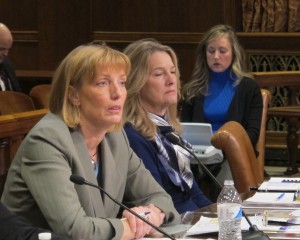As drilling slows, lawmakers question Wolf’s gas tax projections

Marie Cusick/ StateImpact Pennsylvania
Acting DCNR Secretary Cindy Dunn answers questions from lawmakers at a state senate budget hearing Wednesday.
State lawmakers are questioning whether the Wolf administration is being consistent in its projections on how much money gas drilling can bring into state coffers.
Earlier this year the governor imposed a moratorium on new gas leasing for public parks and forests. His executive order undid an attempt by his predecessor, Republican Governor Tom Corbett, to sign more leases and raise an extra $95 million to plug a state budget hole.
At a budget hearing Wednesday, acting DCNR Secretary Cindy Dunn defended Wolf’s moratorium. She argued there was little new interest from gas companies to drill on state land anyway, due to an ongoing lawsuit and poor market conditions.
Given that scenario, Sen. Patrick Browne (R- Lehigh) asked why the administration had such rosy expectations for how much money its proposed gas severance tax can bring in. Wolf says it could raise $1 billion in its first year.
“I’m concerned about the consistency in how we’re talking about natural gas activity and how we’re making projections for the severance tax,” said Browne. “There’s less demand for additional leases on state-owned land, but we’re making very aggressive determinations on volumes and prices.”
Dunn said the situation on state forest land is unique and represents a small part of the overall gas industry. There are currently 517 Marcellus Shale wells producing gas on state land. DCNR received about $120 million from gas royalties last year and expects to bring in $130 million this year. Most of the money will be used to fund its general operating expenses.
“We do make projections rather conservatively,” she said. “Because for the last couple years our operating budget was tied to it, so we didn’t want to make the mistake in the wrong direction on that.”
Browne said that’s precisely why the state should tread carefully as it considers relying on a new gas severance tax.
“The amount generated from that tax is directly driven by dynamics of the marketplace– price and volume,” he said. “If we don’t collectively come down to what the facts are, we’ll be committing ourselves to spending we can’t sustain.”
















